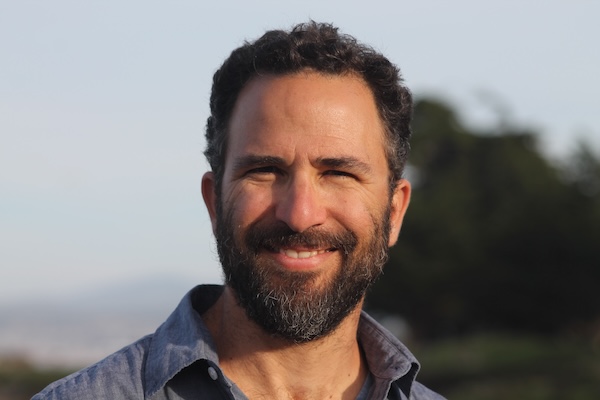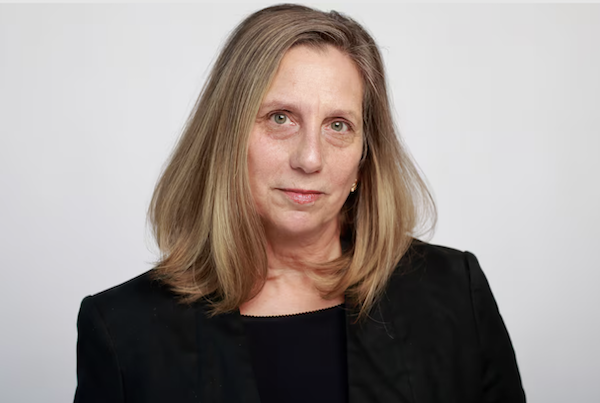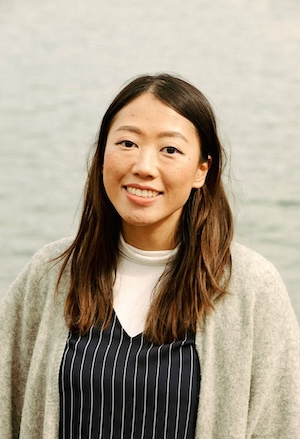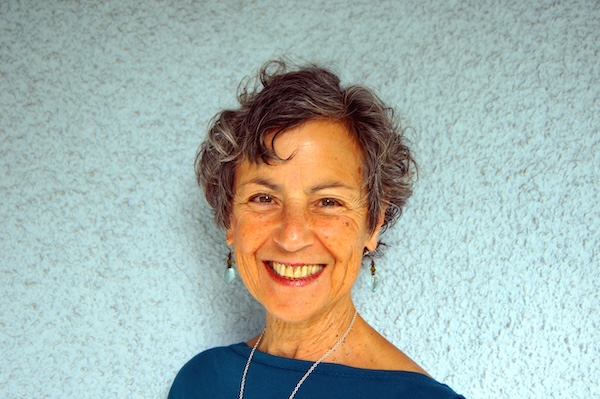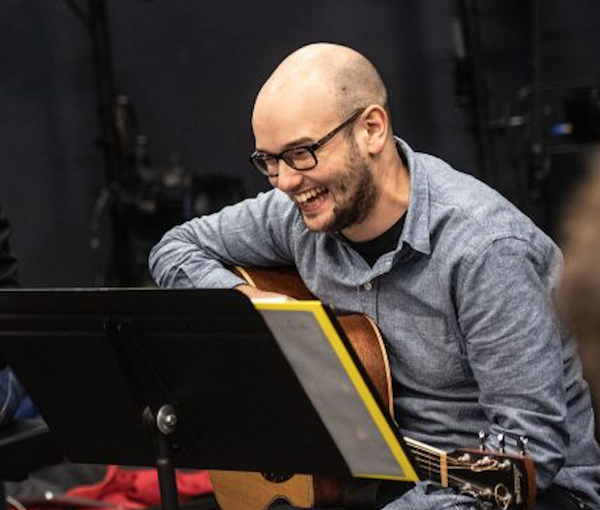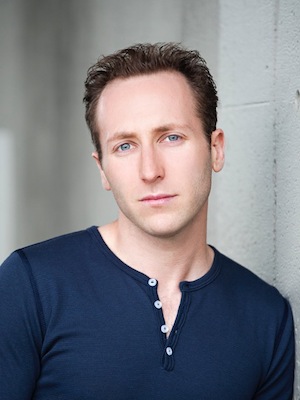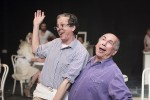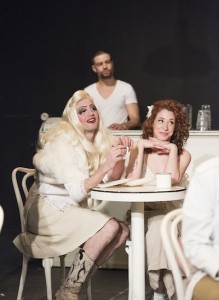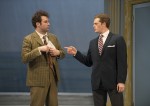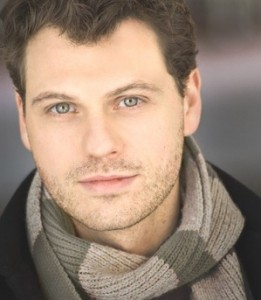Nathan Kay as Sir Andrew in Bard on the Beach’s production of Twelfth Night. (photo by Tim Matheson)
Summer is here again and with it comes that perennial favourite, Bard on the Beach. This year, the BMO Main Stage hosts Twelfth Night and Hamlet, well into September.
First up, Twelfth Night, from Shakespeare’s later period, was written to provide light entertainment for the close of the 12 days of Christmas. Director Diana Donnelly’s adaptation for this comedy is to set it in a carnival-like atmosphere in Illyria, to take advantage of the chaotic shenanigans served up in the narrative (including a fight scene using table tennis paddles). As stated in the show notes, “Illyria is peopled with a bizarre mix of characters: a ringmaster, strongman, rocketman, clowns, pirates and several fortune tellers.”
In Twelfth Night, twins Viola (Kate Besworth) and Sebastian (Charlie Gallant) are separated after a shipwreck. Viola washes up on the shores of Illyria into the midst of the circus. Thinking that her brother has perished, she disguises herself as a man (Cesario) to work for magician Count Orsino (Aidan Correia). Meanwhile, the Count is trying to woo circus star Countess Olivia (Olivia Hutt) and sends Cesario out to do the deed. However, Olivia is not interested in the Count, being preoccupied with other tragic events in her life, and falls for the messenger while the messenger falls for the Count, making for an interesting love triangle.
Add to the mix Olivia’s drunk-but-well-meaning uncle Sir Toby Belch (Marcus Youssef) and his foolish sidekick Sir Andrew Aguecheek (Nathan Kay), cunning maid Maria (Evelyn Chew), the Fool (Anton Lipovetsky, doing double duty as musical director) and, in a gender reversal, the Countess’s puritanical, let-there-be-no-fun manager Malvolia (Dawn Petten), who secretly pines for the Countess, and the mayhem takes off. Amid all this, Sebastian reappears on the Illyrian scene, leading to comical mistaken identity scenarios.
You might as well call this Bard iteration Twelfth Night: The Musical, as cast members often burst into song – terrific original ones by local composer Veda Hille – giving credence to a famous line in the play, “If music be the food of love, play on.” While I found the first act somewhat disjointed and confusing, trying to figure out what was going on when and with whom, the second act saved the day and the enthusiastic cast/music made up for any shortcomings in this adaptation.
To that end, kudos to understudy Besworth, who got the call a day before opening night to step into the shoes of Camille Legg and, without the benefit of rehearsal, gave a sublime performance. Hutt is charming as the Countess, Youssef is as good-humoured as you can get and Gallant does able double duty for the musical bits with guitar and drum work. Bard veteran Andrew Wheeler is the Ringmaster and controls the pace of the circus (when he can). Petten is a standout and takes the concept of emoting to new heights in a sparkly yellow cat suit when she is spun around on the “Wheel of Misfortune,” while being punished by Belch and his cronies for her kill-joy attitude. Very much an ensemble cast, special mention has to be made of the two Jewish community cast members, Kay and Lipovetsky, whose comedic timing and antics will keep you in stitches.
Costumer Mara Gottler has scored a home run with costumes that can only be described as fabulous – particularly Hutt’s colourful sequined frock and a flowing, white, asymmetrically hemmed wedding dress (I want this dress!) complemented with black suede stiletto boots. All the costumes are suggestive of a carnival and set designer Pam Johnson gives the audience a multi-hued circus with colourful games, ladders, balls and banners.
Purists may wince at the liberties taken with the original script but this production will be a hit with those in the summer crowd who are looking for a Shakespeare Lite experience.
For something completely different, there’s Hamlet. I loved, loved, loved it! I have seen many productions of Hamlet but this one is by far the one that gave me the most clarity in understanding the story. This is Shakespeare at his finest.
Stephen Drover, adapter and director, in a brilliant twist of chronology, starts the play off with Hamlet on stage orating the suicide soliloquy (usually in the third act). Right away, we see the angst of the prince as he grapples with life and death (“to be or not to be”). His life is a mess – his uncle Claudius kills his father, the king of Denmark, and takes the throne; his mother, Queen Gertrude, marries Claudius; his best friends from university, uildenstern and Rosencrantz, betray him; and his girlfriend, Ophelia, kills herself. What’s left to live for? It is the dread of what might come after death that “makes cowards of us all” and so Hamlet chooses life on this “mortal coil.”
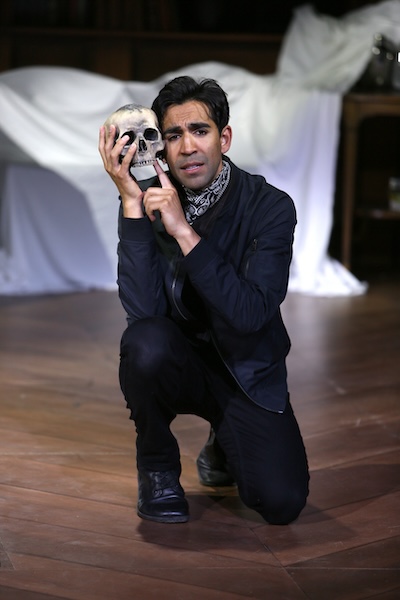
Hamlet is set on his fateful path by an eerie visit from the ghost of his father, who describes his murder most foul and importunes his son to avenge his death. Feigning madness, Hamlet sets off to right what is rotten in Denmark amid the wealth and power of the royal court.
The action includes a foray into a graveyard where actor Lipovetsky injects some moments of lightness into an otherwise dark tale with his comedic take on the gravedigger. We also are privy to the funeral of Ophelia and, in the finale, an epic fencing duel culminates in multiple deaths, including a poignant farewell for Hamlet. Kudos to fight director Jonathan Hawley Purvis for his choreography of this sequence. Choreographer Lisa Goebels also provides some stunning freeze frame dance moments showcasing some fancy footwork by the older royals.
In another interesting staging twist, the original play-within-a-play device, which mimics the king’s death (poison in his ear), becomes a song from traveling performers, played by Christine Quintana and Lipovetsky.
Pam Johnson’s set is a cavernous library with floor-to-ceiling bookshelves and secret doors that allow the actors to enter and exit the stage seamlessly. A huge crown hangs from the ceiling and plays a critical role in the final scene. Being set in the present time allows for contemporary costumes – tattered jeans, T-shirts for the young, fitted dresses and pant suits for Gertrude and double-breasted suits for the older gents, courtesy of costume designer Barbara Clayden.
While this is Hamlet’s story, it really is only made possible through the teamwork of a very skilled cast. Nadeem Phillip Umar Khitab is the quintessential Hamlet, with his physical presence and determination palpable as he undertakes his filial task of revenge. (Starting Sept. 2, Hamlet will be played by Chirag Naik.) Besworth is an ethereal Ophelia who sees no option but to take her life when both her brother, Laertes (Kay), and her father, Polonius (Wheeler), forbid her to have anything to do with Hamlet. Munish Sharma plays Claudius; Jennifer Clement, Gertrude; Ivy Charles and Aidan Correia, Guildenstern and Rosencrantz; and Youssef, the Ghost.
For tickets to any of the Bard productions, visit bardonthebeach.org or 604-739-0559. Comedy of Errors and Measure for Measure run on the smaller Howard Family Stage.
Tova Kornfeld is a Vancouver freelance writer and lawyer.


